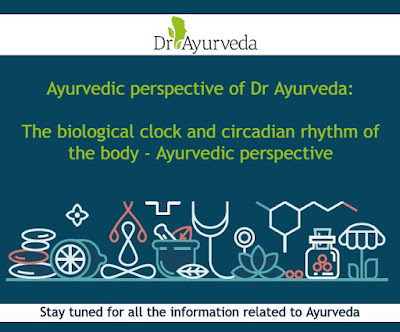The biological clock and circadian rhythm of the body - Ayurvedic perspective
How to live, eat and breathe should be in harmony with nature. In Ayurveda, when our inner body clock is in synch with the natural flow of our lifestyle and activities, then this benefit us with optimal health. An individual’s body’s clock is also known as the circadian rhythm. Millions of body rhythms occur that are managed by the body’s clocks. These clocks are managed by a master clock. The master clock of the body is controlled by nature’s most influential cycle called ‘circadian rhythm’. This regulates everything in our body, including the release of vital hormones e.g. Melatonin and serotonin. Modern science is also in agreement with this.
Disruption of the circadian rhythm, affects the harmonious functioning of the body, including the metabolism and hormonal balance. This makes us susceptible to illnesses as the system goes against the natural flow and consequently has an adverse impact on our life and wellbeing.
We consist of energies and energies surround us. Similarly, each time of the day has an energy. This inner clock functions constantly over a 24 hour cycle. The biological cycle of the body and mind is influenced by the energy of the three doshas. These help to describe the different times of the day and conduct various activities:
● Pitta times of the day are considered to be 10pm-2am and 10am-2pm.
● Vata times of the day are considered to be 2am-6am and 2pm-6pm.
● Kapha times of the day are considered to be 6am-10am and 6pm-10pm.
How to live, eat and breathe should be in harmony with nature. In Ayurveda, when our inner body clock is in synch with the natural flow of our lifestyle and activities, then this benefit us with optimal health. An individual’s body’s clock is also known as the circadian rhythm. Millions of body rhythms occur that are managed by the body’s clocks. These clocks are managed by a master clock. The master clock of the body is controlled by nature’s most influential cycle called ‘circadian rhythm’. This regulates everything in our body, including the release of vital hormones e.g. Melatonin and serotonin. Modern science is also in agreement with this.
Disruption of the circadian rhythm, affects the harmonious functioning of the body, including the metabolism and hormonal balance. This makes us susceptible to illnesses as the system goes against the natural flow and consequently has an adverse impact on our life and wellbeing.
We consist of energies and energies surround us. Similarly, each time of the day has an energy. This inner clock functions constantly over a 24 hour cycle. The biological cycle of the body and mind is influenced by the energy of the three doshas. These help to describe the different times of the day and conduct various activities:
● Pitta times of the day are considered to be 10pm-2am and 10am-2pm.
● Vata times of the day are considered to be 2am-6am and 2pm-6pm.
● Kapha times of the day are considered to be 6am-10am and 6pm-10pm.
During the Pitta times, the digestion is strong between 10am-2pm and hence a good time to digest bigger meals, whilst late evening 10pm-2am is the time for repairing the body’s system and calming/digesting the mental energy; and therefore a favorable time to retire at night. Around the Vata times this represents creativity and cognitive ability. That is why 2am-6am may be a time that could keep you wide awake due to various thoughts and the period from 2pm-6pm helps to create new ideas and use the mental energy efficiently. Kapha times are thought to be the slowest as these are the starting and the winding down parts of the day. During this time motivation may be required as the day begins, in addition it requires a boost to get through the day smoothly.
Knowing your own constitution can help understand the different times of the day in relation to one’s inner body clock. Therefore, raising awareness of your energy levels and how you feel at different times of the day. Practicing this will help to improve and enhance your own daily habits and lifestyle patterns. You will come to realize whether you are living in sync with your body’s natural biological clock or circadian rhythm.
Knowing your own constitution can help understand the different times of the day in relation to one’s inner body clock. Therefore, raising awareness of your energy levels and how you feel at different times of the day. Practicing this will help to improve and enhance your own daily habits and lifestyle patterns. You will come to realize whether you are living in sync with your body’s natural biological clock or circadian rhythm.
Key points:
● The Ayurvedic clock is a study of how to live, eat and breathe in harmony with nature.
● This biological clock is also known as the circadian rhythm.
● The Ayurvedic clock is a study of how to live, eat and breathe in harmony with nature.
● This biological clock is also known as the circadian rhythm.
● In Ayurveda the Doshas: vata, pitta and kapha help to describe different times of the day.
● Vata time is associated with creativity and cognitive ability, Pitta time relates to digestion and metabolism; and Kapha time is slow therefore requiring motivation.
● Knowing your own constitution can help you understand your biological clock/circadian rhythm and in effect have a natural flow to your daily life and well being.
● Vata time is associated with creativity and cognitive ability, Pitta time relates to digestion and metabolism; and Kapha time is slow therefore requiring motivation.
● Knowing your own constitution can help you understand your biological clock/circadian rhythm and in effect have a natural flow to your daily life and well being.
 |
| Ayurvedic perspective of Dr Ayurveda |
No comments:
Post a Comment
Note: Only a member of this blog may post a comment.